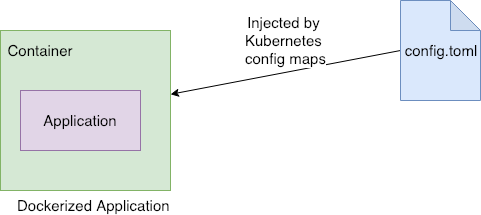原文 https://medium.com/hackernoon/mount-file-to-kubernetes-pod-without-deleting-the-existing-file-in-the-docker-container-in-the-88b5d11661a6
当我试图将 congfigmap 挂载到 kubernetes pod 的已存在的的目录里
概述
几周前开始,我做了一个 tweetor 的简单程序,在谷歌云平台(GCP)的 kubernetes 部署的一个简单教程。这是我做的 Kube X-mas 项目的一部分。这个项目是用 bahasa indonesia 编写的一系列文章,文章地址:https://medium.com/easyread/christmas-tale-of-sofware-engineer-project-kube-xmas-9167ebca70d2
在这个项目里,我将部署一个 golang 的应用程序在 GCP 的 kubernetes 集群里。我们知道,在应用程序开发时,必须将程序和配置分离,无论是环境变量,还是配置文件(.json, .yaml, .toml)。所以为了灵活,我们可以改变配置在 staging、production 或 testing阶段。
在这个案例里,我将应用程序构建成 Docker image ,然后再将它部署到 kubernetes 里,我将使用 kubernetes 注入配置文件,以便应用程序能与注入的配置一起运行。
因此,在 kubernetes 中,我们能将文件注入(挂载)到容器里。在这个例子中,我将应用程序的配置文件挂载到 docker 容器里。为此,我可以使用 kubernetes 的 Configmap 和 Volumes, 它将允许我将配置文件注入到 docker 容器里。
问题
确切的说,我有一个 Go 的应用程序, 将它构建并封装到 Docker image 里,这个应用程序已经编译和构建并保存到了 docker image 里。
这是 Dockerfile
1
2
3
4
5
6
7
8
9
10
11
12
13
14
15
16
17
18
19
20
21
22
23
24
25
26
| FROM golang:1.11.4-alpine as builder
RUN apk update && apk upgrade && \
apk --no-cache --update add git make && \
go get -u github.com/golang/dep/cmd/dep
WORKDIR /go/src/github.com/bxcodec/tweetor
COPY . .
RUN make engine
FROM alpine:latest
RUN apk update && apk upgrade && \
apk --no-cache --update add ca-certificates tzdata && \
mkdir /app
WORKDIR /app
EXPOSE 9090
COPY --from=builder /go/src/github.com/bxcodec/tweetor/engine /app
CMD /app/engine
|
因此,它将构建出一个 Docker image, 在该 Docker image 的 /app/engine 的位置存放了一个 go 的编译完的可执行程序。但是这个应用程序需要注入配置文件,它才能运行。

然后,我使用 kubernetes 的 Configmap 注入配置文件到应用中
1
2
3
4
5
6
7
8
9
10
11
12
13
14
15
16
17
18
19
20
21
22
23
24
25
26
27
28
29
30
31
32
33
34
35
36
37
38
39
40
41
42
43
44
45
46
47
48
49
50
51
52
53
54
55
56
57
58
59
60
61
62
63
64
65
66
67
68
69
70
71
72
73
74
75
| apiVersion: v1
data:
config.toml: |
title = "Tweet Service Configuration"
address = ":9090"
[redis]
address = "redis.staging:6379"
db = 0
pass = ""
[context]
timeout = 2
kind: ConfigMap
metadata:
name: vol-config-tweetor-api
namespace: staging
---
apiVersion: apps/v1
kind: Deployment
metadata:
name: tweetor-api
namespace: staging
spec:
selector:
matchLabels:
app: tweetor-api
strategy:
type: RollingUpdate
rollingUpdate:
maxSurge: 2
maxUnavailable: 0
template:
metadata:
labels:
app: tweetor-api
annotations:
checksum/deployment: TMP_DEP_CHECKSUM
spec:
containers:
- name: tweetor-api
image: bxcodec/tweetor:latest
imagePullPolicy: "Always"
ports:
- containerPort: 9090
readinessProbe:
httpGet:
path: /ping
port: 9090
initialDelaySeconds: 15
periodSeconds: 15
timeoutSeconds: 10
livenessProbe:
httpGet:
path: /ping
port: 9090
initialDelaySeconds: 15
periodSeconds: 15
timeoutSeconds: 10
resources:
limits:
cpu: 100m
memory: 400M
requests:
cpu: 50m
memory: 200M
volumeMounts:
- name: configs
mountPath: /app
volumes:
- name: configs
configMap:
name: vol-config-tweetor-api
|
然而,问题发生了。我期望的是将配置文件注入到和应用程序相同的目录,假设工作目录是 /app。
之前
我期望挂载 configmap 后的状态
1
2
3
| app
├── config.toml
└── engine
|
它发生了什么:
kubernetes 挂载卷替换了所有的文件,并删除了已有的文件,而不是添加一个文件。
我在这个问题上花费了 4 个小时,因为我没有意识到这一点。我的 Pod 一直崩溃并重启。在这之前,我尝试 debug 它,并意识到如果在相同的目录下,挂载了一个文件,也会删除现有的文件。
解决方案
在意识到这个问题之后,我有两个选择。
- 将 docker 容器的工作目录和我的应用程序的工作目录分开,就是替代使用
/app 这个工作目录,我将创建一个新的目录包含我的 WORKDIR, 将配置文件放到里面
- 弄清楚这一切,并解决掉它
选项 1 能解决我的问题,当时我面临此问题,也是选择了选项 1。 但过去了几天后,我出于好奇,选择了选项 2,我尝试再次阅读 官方文档博客,这个问题发生在别人身上,以及如何解决它。
我什么也没有找到,除了这个文章 https://blog.sebastian-daschner.com/entries/multiple-kubernetes-volumes-directory。这个文件解释了多个 kubernetes 目录挂载,我尝试它是否能解决我的问题。
在这个文章中,它尝试使用 subPath, 然后我尝试在 kubernetes 中我的应用的 deployment 使用 subPath。
之前
1
2
| - name: configs
mountPath: /app
|
之后
1
2
3
| - name: configs
mountPath: /app/config.toml
subPath: config.toml
|
咦,它可以工作了,它不会替代和删除目录中已经存在的文件。
我的 deployment 的 全部 yaml
1
2
3
4
5
6
7
8
9
10
11
12
13
14
15
16
17
18
19
20
21
22
23
24
25
26
27
28
29
30
31
32
33
34
35
36
37
38
39
40
41
42
43
44
45
46
47
48
49
50
51
52
53
54
55
56
57
58
59
60
61
62
63
64
65
66
67
68
69
70
71
72
73
74
75
76
| apiVersion: v1
data:
config.toml: |
title = "Tweet Service Configuration"
address = ":9090"
[redis]
address = "redis.staging:6379"
db = 0
pass = ""
[context]
timeout = 2
kind: ConfigMap
metadata:
name: vol-config-tweetor-api
namespace: staging
---
apiVersion: apps/v1
kind: Deployment
metadata:
name: tweetor-api
namespace: staging
spec:
selector:
matchLabels:
app: tweetor-api
strategy:
type: RollingUpdate
rollingUpdate:
maxSurge: 2
maxUnavailable: 0
template:
metadata:
labels:
app: tweetor-api
annotations:
checksum/deployment: TMP_DEP_CHECKSUM
spec:
containers:
- name: tweetor-api
image: bxcodec/tweetor:latest
imagePullPolicy: "Always"
ports:
- containerPort: 9090
readinessProbe:
httpGet:
path: /ping
port: 9090
initialDelaySeconds: 15
periodSeconds: 15
timeoutSeconds: 10
livenessProbe:
httpGet:
path: /ping
port: 9090
initialDelaySeconds: 15
periodSeconds: 15
timeoutSeconds: 10
resources:
limits:
cpu: 100m
memory: 400M
requests:
cpu: 50m
memory: 200M
volumeMounts:
- name: configs
mountPath: /app/config.toml
subPath: config.toml
volumes:
- name: configs
configMap:
name: vol-config-tweetor-api
|
我解决了这个问题的时候,我也学习到了一些重要的东西。当我独自解决这个问题的时候,甚至坚持了 4~6 个小时, 但我在这里学到了宝贵的一课。我期待下一次冒险。
无论如何,你觉得这个有用可以分享这个故事。这样大家就不会掉到同一个坑里,并跟随我继续我的软件工程的学习之旅 :)
引用:
